The governance of the East Asian region is becoming increasingly unstable, as typified by the continued deterioration of relations between Japan and China, and between Japan and South Korea.
Out of the conviction that the private sector should play an important role in breaking the diplomatic impasse, The Genron NPO is making preparations to hold in Beijing "the 9th Tokyo-Beijing Forum" in late October.
In this context, The Genron NPO conducted an opinion poll on current Japanese diplomacy, covering some 800 influential opinion leaders in Japan, including corporate executives, media representatives, bureaucrats, scholars/researchers and NPO/NGO leaders, who have participated in our group's activities to date. A total of 264 people responded to the poll, conducted Sept. 11-13.
The poll results follow.Over Half of Pollees Fear Military ConflictIn this latest poll, The Genron NPO asked the pollees what worries them most when it comes to the ongoing confrontation between Japan and China over the Senkaku Islands.
According to the findings of the poll, the largest 44.3 percent of respondents referred to the eruption of military conflict as the result of an accidental occurrence in the East China Sea, followed by 37.9 percent who cited a full-blown confrontation between the two countries in the wake of overheated nationalism on both sides.
Despite growing concern over the escalation of tensions between Japan and China, only 3.4 percent of the pollees voiced apprehension about its presumably negative effects on the Japanese economy and on the Asian economy as a whole.
Question I: Your Largest Concern About the Japan-China Confrontation Over the Senkaku Islands (Only One Answer/ N=264)
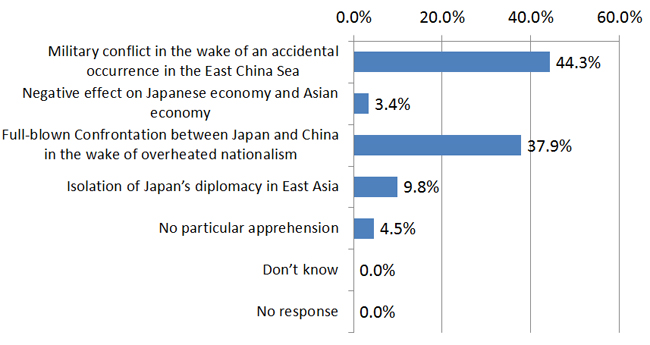
Many Pessimistic About Short-Term Solution to Japan-China Confrontation
Meanwhile, Japanese Prime Minster Shinzo Abe exchanged words with Chinese President Xi Jinping for the first time on the sidelines of the Group of 20 summit in St. Petersburg, Russia, in early September ? a sign of an improvement in the chilly bilateral relations.
In this connection, The Genron NPO asked the pollees about the prospects for mending bilateral relations.
Almost half of the respondents, or 45.8 percent, replied that the Japan-China confrontation would last for a considerably long period of time, although it would eventually be resolved. And almost 40 percent of the pollees, or 38.6 percent, said pessimistically that the Japan-China confrontation would never be solved.
On the contrary, hardly anyone, or 0.4 percent, predicted that the bilateral confrontation would be resolved by the end of this year while only 10.6 percent said it would be solved "within one or two years," echoing the widespread skepticism about any early solution to the bilateral hostility between Japan and China.
Question II: Your Prospects for Japan-China Confrontation over the Senkaku Islands (Only One Answer/ N=264)
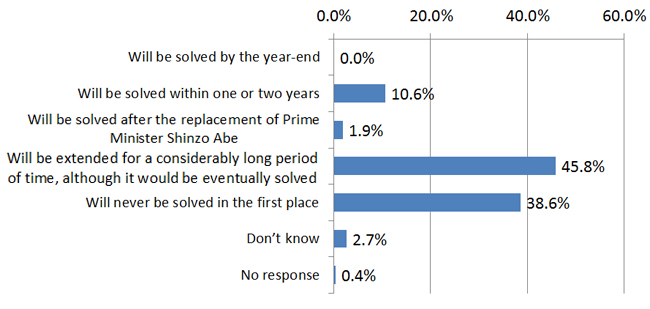
Many Pollees Favor Moves toward Avoidance of Accidental Clash, Peaceful Resolution of Conflict
Asked how the government should cope with the territorial dispute between Japan and China over the Senkaku Islands, the largest number of respondents, 36.7 percent, said that they desire to see diplomatic initiatives on the part of the government to avoid accidental clashes through, for instance, the installation of Japan-China crisis hotlines.
Reaching an agreement between the two governments to pursue peaceful settlement of the bilateral conflict was the second most desired option for the government's diplomatic initiatives.
As shown by the replies to Question I, many pollees place a higher premium on the avoidance of accidental clashes and a peaceful resolution of the bilateral conflict.Meanwhile, the survey found that fewer pollees, or 12.9 percent, favor the settlement of the territorial dispute in accordance with international laws by Japan submitting the case to the International Court of Justice in The Hague.
Also, only about 10 percent favor the reinforcement of Japan's effective control over the Senkaku islets in order to defend Japan's territories (11.7 percent), or the choice of leaving the issue as it is for the time being (10.2 percent).
Question III: How Government Diplomacy Should Cope With the Senkaku Issue (Only One Answer/ N=264)
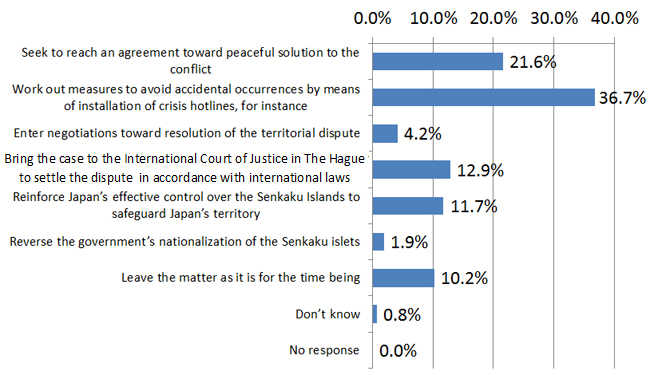
Government's Diplomatic Efforts Are Insufficient
The next question in the latest opinion poll pertains to how the severity of Japan's territorial disputes in East Asia is causing the deterioration of popular sentiment toward neighbors and the overheating of nationalistic fervor.
Question IV asked the pollees whether the government's diplomacy alone could remedy the situation.About 80 percent of the pollees replied in the negative, with 40.9 percent saying that "the government's diplomacy alone cannot remedy the situation" and 39.0 percent saying that "the government's diplomacy alone cannot remedy the situation, relatively.
" Asked to elaborate on the reasons for their answers, many pollees wrote that in order to remedy the situation, it is necessary to promote diverse private-sector multilateral exchanges in economic, cultural, media and other fields, and thereby seek relaxation of tensions, in addition to the government's diplomatic efforts.On the contrary, less than 20 percent of the pollees said that the government's diplomacy alone "can remedy the impasse" (6.4 percent) or "government diplomacy can remedy the impasse, relatively'' (11.7 percent).
Asked why they thought so, many cited China's political system and concluded that the bilateral dispute over the territorial issue could ultimately never be solved without the engagement of governmental diplomatic efforts.
It is also noteworthy that the necessity of scrutinizing the media's news coverage is included in the reasons for each of all the five answers to this question.
Question IV: Can Government diplomacy alone remedy the impasse? (Only One Answer/ N=264)
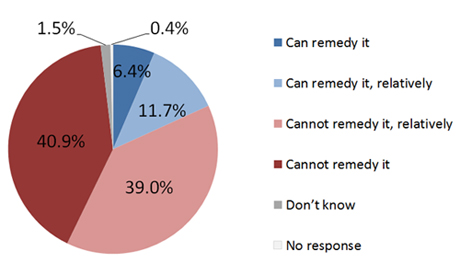
Japanese Intellectuals Desire Calm Discussions
In the latest survey's last question, we asked the pollees in a multiple-answer formula what they expected to see at the Ninth Tokyo-Beijing Forum, a venue of private-sector discussions between Japan and China, which The Genron NPO aims to hold in late October.
The largest number of respondents, 69.7 percent, cited "calm discussions by intellectuals on the current state of relations between Japan and China,'' followed by 51.9 percent who favor "discussions by media people from both countries regarding the deterioration of public sentiment toward each other's country," and 43.2 percent who seek "a private-sector agreement toward avoidance of accidental clashes and peaceful resolution of conflict.
These findings show that many expect to see "calm discussions" at a private-sector venue, which cannot be held in the official channels of governmental diplomacy.
Question V: Expectations on the planned Ninth Tokyo-Beijing Forum (Multiple Answers Allowed/ N=264)
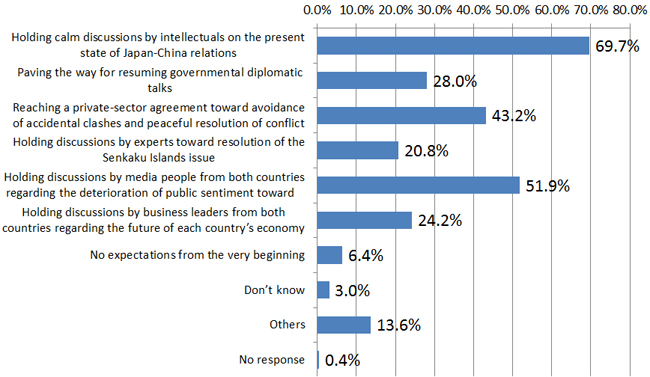
Post a comment